Blocking the Late Reputation for a New Energy Venture: The "Original Top Flow" of the Business Circle
![]() 06/11 2024
06/11 2024
![]() 713
713
PREFACE
Editor's Note
At the end of May, Huang Hongsheng, the founder of Skyworth Group, led a team from Skyworth Photovoltaics to the Shanghai office building of Tsingshan Group.
Here, Skyworth Photovoltaics of the "Skyworth system" and Yongqing Technology of the "Tsingshan system" completed the signing. Focusing on industrial and commercial distributed photovoltaics, they became partners with complementary advantages in developing new energy project cooperation.
Compared to Skyworth Photovoltaics, which has already gained a foothold in the distributed market, Skyworth Automobile started early but has stumbled along the way. "If we don't do it well, our reputation will be tarnished, but if we don't do it, we will surely die with regrets." Huang Hongsheng left such a remark when choosing to make new energy vehicles.
New energy is Huang Hongsheng's choice to block his "late reputation," having chased trends all his life.
Standing on the "36-year-old Skyworth brand" he founded, he won't give up until he succeeds in new energy.
Part One
Success or Failure Are Both Trends
In 2009, Huang Hongsheng, then 54 years old, finally walked out of the Hong Kong prison.
He had learned to calm down in prison after a lifetime of dominance in the business world.
He was thinking about how to get Skyworth back.
For a businessperson, the most important thing is to identify trends. Huang Hongsheng has always been passionate about this, and his ups and downs in the first half of his life were also due to this obsession.
In 1972, when Huang Hongsheng was 16 years old, he had no choice but to go to the countryside.
Looking at the vast Wuzhishan Mountains, which were still a primeval forest at that time, he had his first understanding of the world: "If I had the opportunity to return to the city and become a porter, how happy it would be."
For four and a half years, planting, logging, and reclaiming wasteland, the days in the mountains were especially long. It was not until 1977 that the wind of the times finally blew into this primeval forest, and the college entrance examination was resumed. Huang Hongsheng's long-silent heart beat again. Even though there were only two months from receiving the news to officially participating, he knew he had to take the exam.
In this way, Huang Hongsheng seized the first trend in his life and became one of the first college students after the resumption of the college entrance examination. After graduation, he was also smoothly allocated to work at the South China Import Company of the Ministry of Electronics Industry. The high-quality work platform shaped Huang Hongsheng's broad vision. The computer department he applied to establish created tens of millions of profits for the company at once, and he also had extra money to solve the housing problems of his colleagues.
Huang Hongsheng became a deputy general manager, looking down at the 51 yuan he received every month and up at a world that was undergoing rapid changes due to reform and opening up. He was no longer the young intellectual wearing straw sandals and content to reclaim wasteland in Wuzhishan.
Standing at the second trend, he thought, "Let's start a business."
In 1988, Huang Hongsheng founded Skyworth in Hong Kong to make remote controls. Initially, they relied on giving promotional gifts to repair shops to attract customers, gradually becoming a supplier for first-tier factories.
Remote controls earned Huang Hongsheng tens of millions in just three years. With this money, Huang Hongsheng ventured into the color TV industry. Because the times create heroes, God did not only "create" him but also Li Dongsheng of TCL and Chen Weirong of Konka. They were all from South China Polytechnic Institute (now South China University of Technology) and later divided the home appliance market into three, known as the "Three Swordsmen of South China Home Appliances."
The three of them competed like friends and enemies, binding them for life.
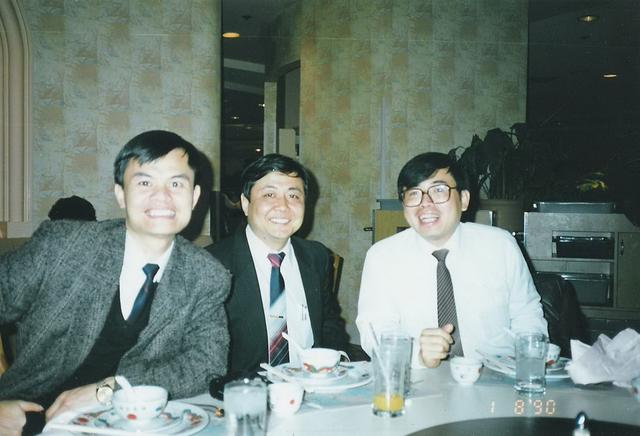
Reform and opening up was a process of going from nothing to something. At that time, it was not popular to talk about dreams because almost everything you did was in short supply. In the early 1980s, the "small fishing village in the circle" began to influx with the first generation of migrant workers; starting in the 1990s, Shenzhen began to sprout various factories, and young people arrived in an endless stream, earning money and chasing stars.
TVB or the Hong Kong cultural industry in the 1990s had a certain global influence. Of course, it was also the spiritual food that "workers" were keen on at that time. But most TVs at that time were single-standard. It was also in the early 1990s that Philips developed the TDA4500 superchip, which solved the problem of picture incompatibility. Skyworth TVs used this chip and could watch TVB as well as American blockbusters, thus selling well.
In 2000, Skyworth went public and raised 1 billion Hong Kong dollars.
At the Hong Kong Stock Exchange, Huang Hongsheng witnessed the power of capital. Inside, earth-shaking changes took place.
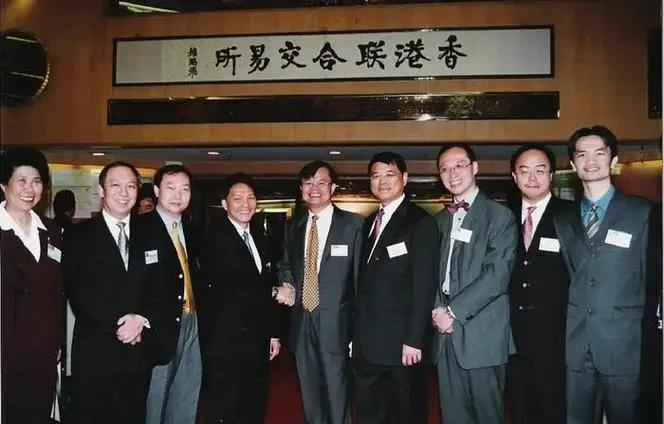
After going public, Skyworth looked glamorous on the outside, but its essence was still a family management model. Later, Huang Hongsheng saw the promising prospects of the real estate industry and ventured into the commercial real estate field, but the huge capital investment eventually led to disaster.
In November 2004, the Hong Kong Independent Commission Against Corruption's Operation Group, code-named "Tiger Mountain March," dispatched nearly a hundred people to Skyworth Group's offices and took away Huang Hongsheng, his younger brother Huang Peisheng, and eight other staff members. The reason given was "suspicion of stealing company funds."
According to the investigation of the Hong Kong Independent Commission Against Corruption, Huang Hongsheng and his younger brother conspired with their mother Luo Yuying and another person named Wang Peng from November 1, 2000, to October 31, 2004, to steal more than 40 million Hong Kong dollars from Skyworth Digital Holdings Limited, as well as a sum of over 2.2 million Hong Kong dollars from Skyworth Network Limited. These funds were deposited into other people's accounts in the form of consulting fees and cash and then transferred to Huang Hongsheng's personal and his mother's accounts.
After much negotiation, on July 13, 2006, Huang Hongsheng and his younger brother were convicted of four charges including conspiracy to steal and defraud Skyworth of more than 50 million Hong Kong dollars, and were sentenced to six years in prison by the Hong Kong District Court.
Huang Hongsheng wanted to smoothly enter the next trend like before, but ultimately fell into the vortex of capital.
After being imprisoned, Skyworth was taken over by professional managers and once flourished even more than before.
Huang Hongsheng deeply understood that the strength of Skyworth would be the premise for him to redeem himself. In 2009, Huang Hongsheng was bailed out of prison, and Skyworth's share price surged accordingly. He had already figured out that the next trend that could enable him to make a comeback was new energy.
According to Huang Hongsheng, "Entrepreneurs are starving wolves who can smell where there is meat to eat." In the second half of 2009, he paid attention to new energy vehicles. He started taking action in 2010, and that year Tesla just went public, while Xiaomi SU7 was not yet a top player. In 2020, Huang Hongsheng began to operate in photovoltaics.
Perhaps what he wants to do is to build a new energy industry chain based on Skyworth's household user base, encompassing automobiles, photovoltaics, energy storage, and charging.
Huang Hongsheng's vision for betting on trends has always been ahead of its time. However, his thinking on brand marketing has been inconsistent. That's why some people say that Skyworth Automobile "got up early but arrived late."
Part Two Building and Eating the Brand
Nowadays, if you don't become a "internet celebrity," you can't even say that you have made a new energy vehicle.
The creation of entrepreneurs' personal IP has already become popular.
Some say that Xiaomi's Lei Jun is the "ancestor" of marketing. But in fact, Huang Hongsheng in the 1990s already realized the importance of establishing a connection with consumers through brands.
Therefore, relying on TVB to open up sales channels, Skyworth TV decided to take an important step and build a brand.
In 1984, the "Joint Declaration of the Government of the People's Republic of China and the Government of the United Kingdom of Great Britain and Northern Ireland" was signed, and the return of Hong Kong was imminent. Huang Yihe, the director of the Spring Festival Gala, came to Guangzhou to look for a Hong Kong singer to participate in the Spring Festival Gala. Walking through the streets and alleys, Huang Yihe often heard the song "Although I wear Western clothes, my heart is still Chinese" in his ears, and he was momentarily filled with emotion. In the end, Huang Yihe decided to invite the singer of this song, Zhang Mingmin, who was still working in an electronics factory at that time, to participate in the Spring Festival Gala. The song "My Chinese Heart" has since been sung nationwide.
In 1997, coinciding with the return of Hong Kong, Skyworth seized the opportunity to resonate with the emotions of Chinese people at home and abroad, inviting Zhang Mingmin to use "My Chinese Heart" to connect Victoria Harbour and the Great Wall, shooting an advertisement titled "Skyworth Emotion, Chinese Heart." Once broadcast, it became an overnight sensation.
Skyworth's domestic brand became famous, and Skyworth TV achieved a leap from annual sales of 100,000 units to 1 million units.
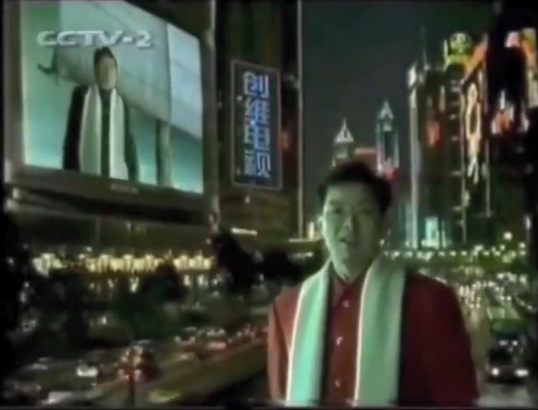
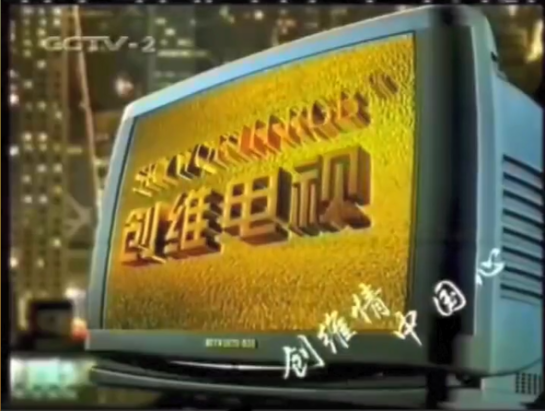
The success of the marketing strategy connected patriotic singers with the Skyworth brand, establishing a good image of Skyworth in the hearts of the people. Even later, when Huang Hongsheng was detained by the Hong Kong Independent Commission Against Corruption, Skyworth also demonstrated excellent crisis public relations capabilities.
On the day of the incident, Skyworth's senior management urgently met with the media to convey information through official channels; as the incident escalated, many suppliers, distributors, banks, etc., came forward to support Skyworth; throughout the incident, Skyworth held press conferences with weight, conveying the core message that "Huang Hongsheng ≠ Skyworth," and both Skyworth and Huang Hongsheng should bear corresponding responsibilities. Skyworth even adopted a "de-Huangization" strategy. After the case was settled, Huang Hongsheng resigned as non-executive chairman and non-executive director of the Skyworth Group board, and a group of relatives gradually withdrew from Skyworth. Until 2012, Skyworth rehired Huang Hongsheng as a group consultant; in 2022, Lin Jin (Huang Hongsheng's son) took over as chairman of the Skyworth Group board.
The Skyworth brand has endured in crises. So when Huang Hongsheng chose the new energy trend, he also needed to leverage the brand effect of Skyworth.
Entering the distributed photovoltaic industry in 2020, Skyworth, with its home appliance background, clearly knew its advantage, which was the household brand influence built over the past 30 years, which could help it significantly shorten the distance from consumers when promoting the photovoltaic market.
In 2021, household photovoltaics developed under the drive of the "county-wide promotion" policy. Skyworth Photovoltaics capitalized on this trend and launched a marketing plan of "0-yuan installation of photovoltaics, free home appliances." Through financial leasing, ordinary people could install photovoltaic power stations without capital investment, while also receiving free Skyworth home appliances and realizing electricity sales revenue. With such a preferential plan and trust in the brand, rural users flocked to Skyworth.
Skyworth Photovoltaics has a market share of around 17% to 18% in the domestic household market, and its main growth point in the next stage will be in developing industrial and commercial distributed photovoltaics and exporting overseas. In the photovoltaic field, Skyworth has embarked on its own "rural surrounding cities" strategy. After all, in the context of fierce competition in domestic module prices, whoever owns the market will be able to "dominate the field."
In 2023, the total operating revenue of Skyworth Group was 69.03 billion yuan, with new energy business contributing 23.4 billion yuan, becoming the second largest main business after smart home appliances.
Skyworth entered the distributed photovoltaic industry, and its competitors were all photovoltaic manufacturers, with marketing strengths easily discernible.
However, in the field of new energy vehicles, Huang Hongsheng encountered only "top students."
In 2010, Huang Hongsheng went on a business trip to Beijing and saw the haze over the city, falling into deep thought. Although he had returned, due to some regulations of the Hong Kong Stock Exchange, he could not return to Skyworth for the time being. The dark haze overhead not only pressed down on Beijing's blue sky but also weighed heavily on Huang Hongsheng's heart, making it extremely oppressive.
With a wave of his hand, Huang Hongsheng sold some of his Skyworth shares. He used 500 million yuan to acquire Nanjing Jinlong Bus Company, which later became King Long New Energy Automobile Company. Despite several setbacks, this field indeed ushered in the "second spring" of Huang Hongsheng's career. In 2015, according to statistics from the Ministry of Industry and Information Technology, Nanjing Jinlong's pure electric bus production reached 8,796 units, ranking second only to Yutong Bus.
However, after obtaining the qualification for new energy passenger cars, Huang Hongsheng did not immediately take action. It was not until 2019 that he founded Skywell and created a genuine passenger car. But this car, which was launched in mid-2020, only had an insured volume of over 400 vehicles for the entire year. Huang Hongsheng, who had experienced the brilliant achievements of Skyworth TV, attributed this to the lack of brand influence. Therefore, he spent over 20 million yuan to buy the right to use the Skyworth trademark.
After "dressing Skywell in Skyworth's clothes," Huang Hongsheng's marketing strategy gradually became "magical." The selling point he created for Skyworth Automobile was actually "health preservation."
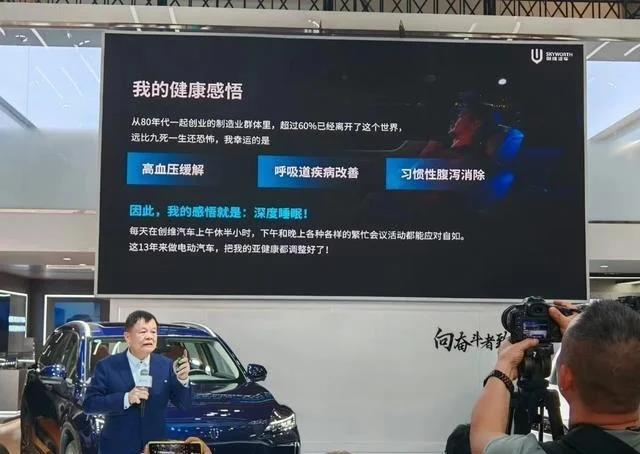
On April 25th, he even appeared in person to illustrate, with the PPT boldly stating "relieves hypertension, improves immunity, and eliminates habitual diarrhea."
The detachment of "health preservation" from "automobiles" meant that no one believed his story this time. The failure of the marketing strategy not only failed to open up the market for Skyworth Automobile but also lowered the public's favorability towards the Skyworth brand. The so-called "black red is also red," and this alternative marketing gimmick temporarily brought a lot of media exposure to Skyworth Automobile.
On May 11th, both the official social media accounts of Skyworth Automobile and Huang Hongsheng responded.
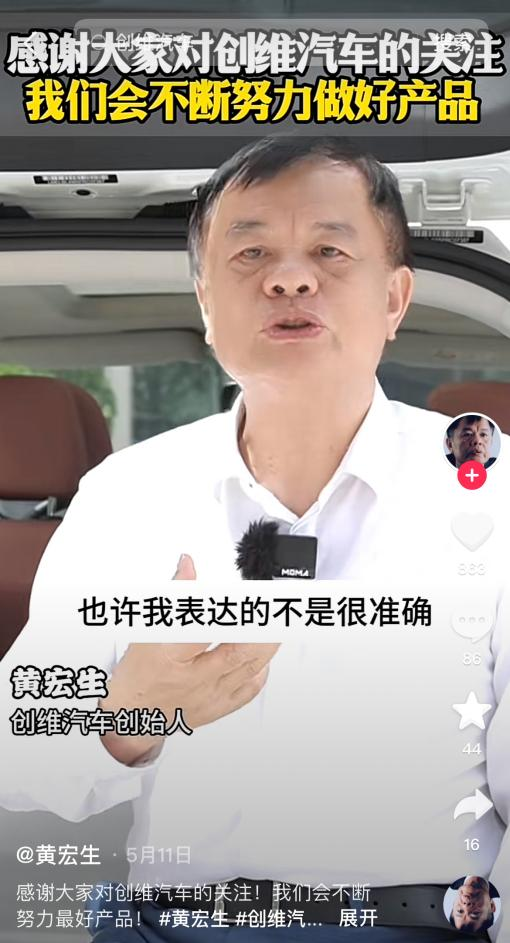
adv








